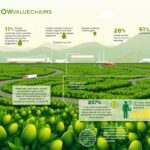Did you know one in ten eligible voters in the 2024 election will be from Generation Z? That’s about 24 million young Americans ready to shape politics. Gen Z’s diversity and progressivism set them apart from older generations. The Great Recession and the COVID-19 pandemic have deeply influenced their views on key issues.
Generation Z, born between 1997 and 2012, is changing the American political scene. They’re becoming crucial to the future of American politics with their active participation and progressive values. As they start voting, we’ll need to understand what drives them. This will change how we engage with young voters now and in the future.
Key Takeaways
- Gen Z comprises about 10% of eligible voters for the 2024 election, totaling approximately 24 million individuals.
- This generation is characterized by significant diversity and progressive values, influencing their political priorities.
- Experiences such as the COVID-19 pandemic have shaped Gen Z’s views on socio-political issues.
- Their unique perspective is set to redefine the landscape of American politics.
- Understanding Gen Z’s engagement will be essential for shaping effective political strategies moving forward.
Introduction to Gen Z and Their Political Influence
Understanding Gen Z’s impact on politics is becoming more important as they become a major voting force. About 70 million people in the U.S. are part of Gen Z, and around 40 million could vote by 2024. In the 2020 election, just over half of the eligible Gen Z voters made their voices heard. This shows a change in how people are participating in elections.
When we look at how young people engage with politics, it’s clear Gen Z is influenced by their own experiences and values. They grew up with technology everywhere and have been part of key social justice movements. These aspects make them more vocal in political discussions. However, their trust in traditional institutions like Congress and the criminal justice system is low. Only one in six trusts these institutions a lot, and less than a quarter believe in the Supreme Court or online information.
Despite their doubts about certain institutions, an impressive 71% of Gen Z trust in science. This shows they can hold different views at the same time. Younger members of Gen Z, those between 12 and 18, tend to trust the military and police more than older Gen Z folks. This suggests that their views on authority are complex and affect how they engage politically.
The political leanings of Gen Z are also noteworthy. Almost a quarter see themselves as independents, which might mean they’re moving away from traditional political parties. They demand conversations that can adapt and respond to their needs. With a strong 71% seeing climate change as a serious threat, their priorities could shape future policies and election results significantly.
Understanding Gen Z: A New Generation of Voters
Gen Z, born between 1997 and 2012, brings a fresh approach to politics in the U.S. They’ve grown up amid major political events and have a strong desire for social justice. This is seen in their Gen Z demographics and the challenges they encounter. Their background and experiences greatly shape their political views and actions.
Demographic Traits of Generation Z
Gen Z is the largest, most diverse generation in U.S. history with about 70 million people. More than half are non-Hispanic white, marking a demographic shift. This generation is vocal about issues like climate change, social justice, and reproductive rights. Their diversity shows in the “reverse gender gap,” with women and LGBTQ individuals leading in political engagement.
Educational Background and Political Awareness
Education is key for Gen Z’s political involvement. With 57% of 18- to 21-year-olds in college, education links to political activity. Studies show these informed young people are more motivated to vote and keep up with political news. However, 50% of Gen Z non-voters feel uninformed, which points to a need for better voter education.
Gen Z Politics: Key Issues and Priorities
Gen Z is reshaping politics with their fresh viewpoints. They prioritize issues like climate change and racial justice, influenced by their life experiences. Their approach to politics shows a deep commitment to making a difference in society.
Progressive Values and Social Issues
Gen Z is heavily engaged in social matters. About 30% are part of the LGBTQ community, showing their focus on inclusivity. Also, reproductive rights are key for 29% of them, highlighting their progressive nature.
When it comes to politics, 30% say they’re Democrats, while 24% are Republicans. Another 28% see themselves as Independents. This shows how they’re moving away from strict party affiliations to align more with their own values.
Views on Climate Change and Racial Justice
For Gen Z, climate change is a top concern with 21% voting on this issue. They feel a duty to protect the environment. Their stance is backed by the belief of 54% that climate change is due to human actions.
Racial justice is also vital to them, leading to high participation in relevant movements. They’re driven by a shared desire for societal accountability and positive change.
The Importance of Youth in Politics
Youths play a key role in shaping democracy and affecting policy choices. Knowing the history of their political involvement shows our progress and today’s key challenges.
Historical Context of Youth Political Engagement
Youths have been vital in key moments, like the civil rights movement and Vietnam War protests. These events spurred on generations and paved the way for more youth political activity. Looking back, we see youths driven by a need for change, influenced by current events and justice movements. This desire for change continues, pushing new generations to vote and engage in activism.
Current Youth Voter Trends and Statistics
Now, more young people are getting politically involved. Surveys show 57% of young people, ages 18-34, are likely to vote in the 2024 presidential election. This highlights their determination to shape politics. While 19% see politics as very important, 68% feel adults haven’t properly tackled big political issues.
About 51% who focus on climate change are more likely to vote. Also, 61% view it as a serious threat, and 53% are worried about inflation and living costs. A large 75% believe they can improve their community’s well-being, showing young voters’ commitment to civic duty.
This trend points to youth being crucial for the future of U.S. politics. They offer new ideas and tackle issues important to them. Below is a table summarizing key statistics for young voters in the upcoming elections:
| Statistic | Percentage |
|---|---|
| Youth likely to vote in 2024 | 57% |
| Support for Democratic candidate among likely voters | 51% |
| Youth prioritizing climate change | 61% |
| Total youth identifying politics as important | 19% |
| Youth expressing frustration with political system | Approximately 75% |
Future of American Politics: The Impact of Gen Z
Looking ahead, Generation Z’s role in American politics is huge. Around 40.8 million Gen Z members will soon vote in elections. Their unique views and values will change political party strategies, especially on important issues like climate change and social justice.
Predictions for Future Elections
Gen Z voters are less tied to traditional political parties than older generations. This means political parties need to change to appeal to young voters’ values. With fewer young people sticking to old party lines, we’re entering a new phase in politics where being open and listening to young voters is key.
Role in Shaping Political Parties
Gen Z’s influence goes beyond just voting. They’re shaking up usual politics and making parties rethink their core issues. As experts in using social media for activism, they’re changing American democracy. Their push for inclusivity and diverse voices is setting the stage for future electoral success.
The Power of Social Media in Gen Z Political Activism
Social media is crucial for Gen Z’s political engagement. It helps us organize, share info, and connect on important issues. Sites like Instagram, TikTok, and Twitter are our go-tos for expressing views and rallying support. This era allows us to join forces online, making real-world impacts.
Platforms Used for Political Engagement
For Gen Z, social media is key in championing causes. With impressive stats, 70% of us support social or political initiatives online. The School Strike for Climate is a prime example. It drew 1.4 million youths globally, showing our unity on significant concerns through these platforms.
| Platform | Primary Usage for Political Engagement | Engagement Statistics |
|---|---|---|
| Sharing visuals and updates on social causes | 34% say it inspires them to take action | |
| TikTok | Creating entertaining yet informative content | 52% believe young people influence change |
| Rapid information sharing and mobilization | 69% feel anxious after seeing climate change content |
The Role of Influencers in Political Mobilization
Influencers play a big part in political activism. They get us talking about important issues and push us to take action. Studies show 20% of Gen Z won’t support brands that differ from our values. This shows we seek genuine messaging. As such, influencers have the power to amplify our causes.
Our actions on social media do make a difference. This generation is ready to advocate for change and inspire each other. Together, we’re shaping a better political landscape.
Young Voters Impact: Comparative Analysis with Millennials
When we look at how Millennials and Gen Z vote, we notice they’re quite different. Both groups care about making progress, but Gen Z leans more on the government to solve problems. Since they grew up with technology, it affects their political views. This matters when we think about their effect on elections and political trends.
Differences in Voting Patterns
Young people vote in their own special way, which can really change election results. The 2024 election is a big deal because many Gen Z-ers will vote for the first time. They don’t vote the same as Millennials because what they’ve been through is different.
- Approximately 53% of young Americans ages 18-29 are likely to “definitely vote” in the upcoming presidential election.
- Gen Z is critical about how American democracy works, especially concerning money and who gets represented.
- Younger conservatives are starting to think more about equality than older ones.
- Many from Gen Z, who care a lot about social and environmental issues, will be active voters.
Common Goals and Diverging Views
Young voters often agree on important issues, but sometimes their views split. Knowing this helps us understand their voting habits better.
Here are some key differences:
| Characteristic | Millennials | Gen Z |
|---|---|---|
| Likelihood to Vote in 2024 | 54% | 53% |
| Government Intervention Support | Lower | Higher |
| Disillusionment with Political Choices | 44% | Strongly expressed |
| Trust in Institutions | Generally higher | Significantly lower |
The way young voters are changing shows a lot about the future of politics in the U.S. Keeping an eye on these trends is key for understanding where politics is headed.
Political Engagement of Youth: Trends and Observations
Young voters, especially Gen Z, are getting more involved in politics than past generations. They actively engage in discussions and support grassroots movements. Many young adults are coming together to support important issues and push for changes in policies they care about.
Levels of Political Participation Among Gen Z
About 56% of young Americans say they will “definitely” vote in the next election. This number jumps to 72% among those who are already registered to vote. Also, more young Democrats than Republicans, 74% to 60%, say they plan to vote. This shows Gen Z cares deeply about big issues like climate change, healthcare, and stopping gun violence.
Mobilizing for Grassroots Movements
Gen Z’s grassroots efforts are making a big impact on political discourse and rallying support for various causes. They use social media to share their messages and organize events. A survey finds that 69% of Gen Z thinks helping underprivileged students is very important. This shows their strong desire for societal change through advocacy, protests, and community organizing.
Challenges Facing Gen Z in Political Participation
Generation Z runs into many barriers to youth voting. These block their political involvement. Systemic obstacles make it tough for them to register and vote. It’s important to understand these challenges so we can find ways to get young people more involved.
Barriers to Voting and Engagement
Many in Gen Z really care about politics, with nearly 75% involved in social or political issues. However, only 28.4% voted in the 2022 midterms. The reasons for not voting include:
- Strict voting laws that are tougher on young people.
- Problems with the registration process; 16% of unregistered young people said it was hard to figure out.
- Voter ID rules adding more obstacles, like those in Texas.
Studies find that states with easier election laws have more young voters. These include same-day registration and online registration. Still, many young people don’t know their voting rights or how everything works.
Potential Solutions and Mobilization Strategies
To solve the Gen Z participation challenges, we need to act. There are ways to get more young voters involved:
- Making registration easier online.
- Launching campaigns to teach young people about voting rights and why it’s important to vote.
- Using social media to spread information about elections and how to vote.
With 41 million young people eligible to vote soon, getting them to participate is key. By focusing on education and making voting easier, we can break down some barriers.

The Future of American Politics: An Inclusive Landscape
American politics is changing. The voices of Gen Z are becoming louder. As they vote and lead, politics will become more diverse. This change is not just about who lives in the U.S. It’s also about making decisions that everyone agrees with.
Increasing Diversity and Representation
Gen Z is pushing for more diversity in politics. More minority representatives are being elected. These new voices make decision-making better for everyone. Young voters are showing up in big numbers at elections. By 2028, Gen Z will be the biggest group of voters. Their impact on politics will be huge.
Implications for Policy Making
More diversity in politics means new ideas for laws. Gen Z cares about many issues, like gun safety, climate action, and fairness. They might change their political views if leaders don’t address these concerns. Listening to everyone’s voice is key to making good policies.
| Demographic | 2020 Voting Margin | 2024 Voting Margin | Key Influencing Factors |
|---|---|---|---|
| Voters aged 18-29 | Democratic +24% | Loss of Democratic Margin | Shifts in alignment towards right-wing figures |
| Young Men | Historically Progressive | Increasingly Right-wing | Influence of commentators like Ben Shapiro and Charlie Kirk |
| Projected Minority-Majority Country | By 2045 | N/A | Need for DEI Policies |
Gen Z and Elections: A Turning Point in Voter Dynamics
Gen Z’s role in big elections marks a key change in how we view voting today. Looking at the 2020 and 2022 elections shows us this change. Young people are now using apps like TikTok to get political news. This is making political groups change their ways to address what young voters care about.
Engagement During Major Elections
Recently, about 70% of young voters used social media for political news. This shows how political communication is changing. The 2024 election is bringing out new voting trends among different groups. For example, 25% of young Black men and 22% of young Black women may vote for Trump. Among Latinx voters, 25% of young women and 40% of young men showed similar support.
Young voters are really concerned about inflation and housing costs more than social issues. This changes how candidates try to win over Gen Z’s votes. The interest in humanitarian help and less approval of Biden’s economic policies shows diverse beliefs. These could change how young people vote in the future.
Long-term Voter Loyalty and Trends
Looking at how young people stick with political parties gives us insight into future voting. After voting in a few elections, people often stick with a party based on their early choices. There’s been a big move toward the Democratic Party after Trump’s time. This means Gen Z might stay closer to the Democrats if their values match.
Though feelings about the major parties change, most voters still lean towards either Democrats or Republicans. This long-standing pattern matters more in today’s divided political scene. Many young voters feel hopeless, affecting their political views and voting future. Understanding these trends helps us see how politics is changing as we look ahead to more elections.
Political Activism Gen Z: Case Studies and Examples
Gen Z has become a major player in American political activism. They tackle big issues with great passion. This group brings new ideas and a sense of urgency to fighting for social change. We will look at important moments led by Gen Z. These moments show their smart tactics and the obstacles they encounter.
Notable Movements Led by Gen Z
Gen Z has been at the forefront of climate justice with groups like the Sunrise Movement. They have also been crucial in racial equality protests like those sparked by Black Lives Matter. This showcases their commitment to solving critical social problems. They’re savvy with using Instagram and TikTok too. This helps them get people involved and spread their message far and wide.
Successes and Limitations of Activism
Gen Z’s activism has seen big wins but also faces challenges. One issue is that their efforts are often spread out, making it hard to stay united. Also, how much people get involved can change a lot. This makes it tricky to keep initiatives going strong over time. However, these young activists have really changed how people think. They show the strengths and limits of what young people can do.
| Challenge | Description | Potential Impact |
|---|---|---|
| Fragmentation of Movements | Decentralized efforts often lack a cohesive agenda, which can dilute messaging. | Decreased public support and engagement. |
| Varying Engagement Levels | Inconsistent participation rates among Gen Z activists can impede momentum. | Challenges in sustaining long-term initiatives. |
| Digital Reliance | Heavy dependence on social media limits outreach to non-digital audiences. | Potentially excludes segments of society less engaged online. |

Conclusion
When we think about Gen Z’s role in politics, we see they will change our political world in big ways. A huge 79% of young Americans say they’ll vote more if their friends do too. This shows how strong their effect on voting is. They care deeply about big issues like climate change and fixing healthcare.
The politics of today are changing fast, partly because of people like Kamala Harris. She’s really popular with voters under 30. These young people care a lot about issues that matter to them. Their strong voices and actions in recent elections show they’re ready to help shape our country’s future.
Gen Z’s ongoing activism marks a big shift in American politics. Knowing what they care about is key to keeping up with these changes. As we go forward, it’s important to listen to this generation. Their diverse views will help make our democracy better and more inclusive.
How Does Project 2025 Reflect the Perspectives of Gen Z on American Politics?
Gen Z is actively shaping the future of American politics, and “exploring project 2025 policy changes in america” highlights their drive for innovation and inclusivity. This initiative addresses their concerns on climate change, social justice, and economic disparity, aiming to create a more equitable and sustainable future for all.
FAQ
What defines Generation Z’s political views?
Generation Z stands out for its forward-thinking values. They care deeply about issues like racial fairness and protecting our planet. Their high education levels and life experiences help them stay politically active and fight for fairness for everyone.
How does Gen Z engage in political activism?
Gen Z uses platforms like Instagram, TikTok, and Twitter to share their political views. They use these sites to gather support for important causes. They also make their opinions heard on big issues.
What is the importance of young voters in American politics?
Young voters, especially those from Generation Z, are changing the political scene. Their growing involvement influences elections and shapes party policies. They’re making political groups pay more attention to progressive ideas.
How does Gen Z’s voting behavior compare to Millennials?
Gen Z and Millennials both support progressive policies. But Gen Z is more in favor of the government tackling issues like climate change and justice for all. Their tech-savvy nature leads to different priorities and ways of voting compared to Millennials.
What challenges does Gen Z face regarding political participation?
Gen Z faces hurdles like restrictive voter ID laws and problems with voter registration. Overcoming these obstacles with better systems and voter rights education is key to boosting their involvement in politics.
What impact will Gen Z have on future elections?
As they become a bigger part of voters, Gen Z’s choices will greatly impact future elections. Experts think their values will make political parties focus more on issues like climate action and fairness for all.
How does Gen Z’s diversity influence politics?
The diversity within Gen Z is likely to create a welcoming political world. With more leaders from different backgrounds, politics will cover a broader range of views. This ensures even the overlooked voices are heard.
What notable movements has Gen Z led?
Gen Z has been at the forefront of fights for climate justice and racial equality. Their actions show they can gather support and address big social problems using creative online methods.









































































































